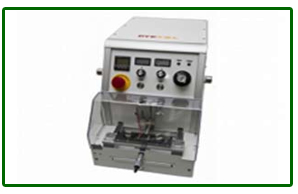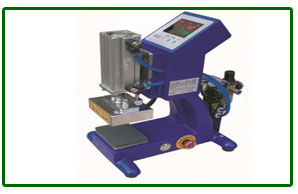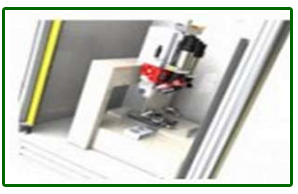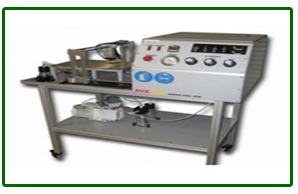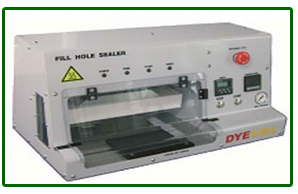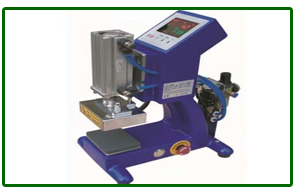Use:
Test Cell Assembly Machine is used in DSSC R&D for quickly and easily assembles the multiple DSC test cells.
Description:
Test Cell Assembly Machine (TCAM) provides a rapid, reliable and repeatable method for the assembly and permanent sealing of DSC test cells.
The TCAM applies flat, equal pressure across the cell for even sealing. A combination of light mechanical pressure and resistive heating is used in sealing. An electrical current is passed through the conductive layer on the glass substrate of the counter electrode to melt a thermoplastic gasket between the counter and working electrodes.
The temperature which the counter electrode reaches can be controlled by adjusting the voltage which controls the current allowed to flow through the conductive layer. This is important because excessive temperatures will damage dyes. The mechanical pressure applied to the cell during construction and the time of application can be varied by adjustable pressure regulator and a timing unit. This is important because it ensures consistent, repeatable cell construction.
Specifications:
| Features | Description | Benefits | |
| Variable Voltage Application | Voltage range DC 0 V – 40 V Maximum current 3 Amps | Allows you to control voltage and current application for test cell sealing. | |
| Timing Control | Timing range from 0.1 to 999 seconds | Allows users to specifically control and program the time for pressure application | |
| Pressure Control | Up to 700kPA | Allows users to specifically determine the amount of pressure to apply to the cell via the sealing mechanism. | |
| Safety Features | Safety shield with interlock-Emergency stop button -Mains power cut out at less than 200kPa |
Protects user during TCAM operation from potential manufacturing and assembly hazards | |
| Machine Requirements | -Electricity: 230V AC, 50Hz- Air Supply: 7 bar maximum Clean, Dry, Air Compressor | ||
| Substrate Size | Substrate thickness is between 2 & 6mm,Working Electrode: Min = 20mm x 20mm, Max = 20mm x 25mmCounter Electrode: Min = 30mm x 20mm, Max = 50mm x 20mm | ||
Use:
Test Cell Heat Press machine is used in DSSC R&D to seal DSC test cells.
Description:
The Test Cell Heat Press machine provides a rapid method for the assembly and permanent sealing of DSC test cells.
The Test Cell heat press machine applies pressure across the cell for sealing. A combination of light mechanical pressure and heating is used in sealing. A heated element applies pressure to the glass substrate of the counter electrode to melt a thermoplastic gasket between the counter and working electrodes.
The temperature which the counter electrode reaches can be controlled by temperature set by the user to the heating head and the length of time of applied pressure. This is important because excessive temperatures will damage dyes. The mechanical pressure applied to the cell during construction and the time of application can be varied by adjustable pressure regulator and a timing unit. This is important because it ensures consistent, repeatable cell construction.
Specifications:
| Features | Description | Benefits | |
| Cell Size | Up to 60mm x 60mm maximum | Can accommodate sealing of up to two standard test cells | |
| Physical Dimensions | -52mm(L) X 224mm(W) x 315mm(H)-Weight 13kg | Compact design fits well in most laboratories and workshops. | |
| Panel Display | Displays Temperature and time with control buttons to adjust user requirements | ||
| Temperature Range | Up to 230°C | Suitable to melt standard thermoplastic gaskets | |
| Timing Range | 0 to 9999 seconds | User controllable timing period allows for optimization of sealing differing materials | |
| Machine Requirements | -Electrical: 220VAC 12A 60Hz- Air supply: 6 bar maximum Clean, Dry, Air Compressor | ||
Use:
Primary Seal & Interconnect Dispenser machine is used in DSSC R&D to dispense curing polymers, conductive interconnect materials, and insulating sealants on DSC cells.
Description:
Primary Seal & Interconnect Dispenser machine is an automated, multi-head, high viscosity fluid dispensing system which can be programmed to dispense continuous lines of two part neutral curing polymers or the application of conductive interconnect materials and insulating sealants for the construction of series connect and parallel DSC cells.
The system utilizes highly versatile servo motion controllers and precision parts for accurate movement of the dispensing heads allowing for reproducible dispensing on multiple substrates during a production run.
The standard unit is supplied with provision to dispense two off, 1:1 ratio, and two part products from disposable syringes, each with a total capacity of 50ml of material. The mixing system, utilizing disposable static mixers, has been optimized to suit Primary Seal & Interconnect Polymers, to reduce waste and ensure a complete amalgamation of the polymer components.
Force is applied to the syringe’s pistons through rods actuated upon by pneumatic arms. The dispensed volume over time is directly related to the pneumatic pressure applied to the actuator. The pressure for the two dispensing units is independently controlled by precision regulator mounted on the main control panel. The standard unit is suitable for glass substrates with a dimension of 178mm x 100mm, with a thickness of 2.3mm or 3.2mm. It has the capacity to accept Substrate Locating Jigs for sizes up to 210mm x 300mm with a thickness between 1mm to 6mm. The substrate locating jig utilizes an advanced coating provides a durable finish, it allows effortless cleaning of cured and un-cured polymers if a spill occurs.
Specifications:
| Features | Description |
| Dispense Rate Control | Processor driven pneumatic arms |
| X, Y, & Z Programming | Laptop JR C-points Software |
| Manual Z Axis | Micrometer correction adjustments |
| Robot Type | Cartesian |
| Substrate Size | 178mm x 100mm |
| Max. Active Working Area | 300mm x230mm |
| Machine Requirements | Electrical: 240VAC 50/60HzAir Supply: 9bar maximum Clean, Dry, Air Compressor |
| Syringe Types | D50 |
| Mixing System | Static |
| Safety Features | Light curtain and polycarbonate shielding protects user during operation |
Use:
Electrolyte Filling Machine is used in DSSC R&D to fill electrolyte into small single test cells or larger DSC cells as alter and modify DSC prototype designs.
Description:
The Electrolyte Filling Machine (EFM) will help to fill the electrolyte into individual test cells or larger DSC cells by using rigid counter and electrode substrates.
The Electrolyte Filling Machine is manually operates and fills one cell at a time using an upward facing head block.
The head block can access fill holes at any position on a 300mm x 300mm cell, this is best suited for experimental use when you need to prototype and optimize a range of DSC cell designs.
Advantages:
- Machine offers the great flexibility in the cell design and process variation.
- Machine minimizes the electrolyte wastage by recovering and recycling it from internal plumbing and heat cavities
Specifications:
| Features | Description | Benefits | |
| User Control | A range of user controls enable the operator to control and vary the time for each sequence manually, determine the exact location for electrolyte filling across the entire available area. | These advanced user controls allow for precision, variation, and most importantly the ability to access any position on the work area for the application of electrolyte | |
| Robust Materials | The EFM is made from a robust Aluminum frame, incorporates a hard wearing stainless steel plate for DSC device placement, and utilizes Viton tubing and Teflon components for all wetted parts to ensure chemical compatibility to most electrolyte solvents. | This equipment will wear well under heavy use in your lab. | |
| Machine Requirements | Electrical: 220/240VAC 50HzAir Supply: 3bar maximum Regulated compressed Nitrogen | ||
| Substrate Size | Minimum: 20mm x 20mmMaximum: 300mm x 300mmThickness: 2mm to 4mm | Accommodates standard test cells | |
Use:
Fill Hole Sealer machine is used in DSSC R&D to apply a sealing strip over the electrolyte fill holes on Dye Sensitized Solar Cell
Description:
The Fill Hole Sealer machine applies a thermoplastic-coated metal foil seal over the fill holes on the DSC cell, after the electrolyte filling operation.
The system gives the ability to adjust temperature, time and pressure of seal application to insure a robust repeatable seal.
Once the desired settings are selected, press start on the machine and the automatic sealing cycle begins. Fill Hole Sealer machine is suitable for thermoplastic gasket sealed test cells.
Specifications:
| Features | Description | Benefits | |
| Timing Control | Timing range from 0.1 to 999 seconds | Allows users to specifically control and program the time for pressure application | |
| Pressure Control | Up to 700kPA | Allows users to specifically determine the amount of pressure to apply to the cell via the sealing mechanism | |
| Alignment Jigs | User adjustable alignment jig | Enables fast cell alignment and consistent quality seal | |
| Robust Materials | Non-stick Teflon coated sealing surface. | Eliminates thermoplastic build-up and provides users with an easy to clean and maintain machine. | |
| Machine Requirements | Electrical: 240VAC 50/60HzAir Supply: 7bar maximum Clean, Dry, Air Compressor | ||
| Substrate Size | Up to 285mm x 20mm | Accommodates standard test cells size up to A4 in size | |
Use:
Fill Hole Heat Press machine is used in DSSC R&D to apply a sealing strip over the electrolyte fill holes on DSC Test Cells
Description:
The Fill Hole Heat Press machine applies a thermoplastic-coated metal foil seal over the fill holes on the DSC Test Cells, after the electrolyte filling operation.
The system gives the ability to adjust temperature, time and pressure of seal application to insure a robust repeatable seal.
Once the desired settings are selected, press start on the machine and the automatic sealing cycle begins. Fill Hole Heat Press machine is suitable for thermoplastic gasket sealed test cells.
Specifications:
| Features | Description | Benefits | |
| Cell Size | Up to 60mm x 60mm maximum | Can accommodate sealing of up to two standard test cells | |
| Panel Display | Displays Temperature and time with control buttons to adjust to user requirements | ||
| Temperature Range | Up to 230°C | Suitable to melt standard thermoplastic gaskets | |
| Timing Range | 0 to 9999 seconds | User controllable timing period allows for optimization of sealing differing materials | |
| Machine Requirements | -Electrical: 220VAC 12A 60Hz- Air supply: 6 bar maximum Clean, Dry, Air Compressor | ||
Use:
Ultrasonic soldering machine is used in DSSC R&D for flux free, high quality ultrasonic soldering.
Description:
Ultrasonic Soldering machine is special new generation solderer based on heat and ultrasonic vibrations. The induced cavitations effect replaces usage of flux as well as the cleaning process, since there is no exhaust fumes and pollution. By combining this device with peculiar solder alloys, it can solder on almost of all the materials, for example glass, ceramics, aluminum, molybdenum etc. (except for organic substances) Mounted tips on the ultrasonic solderer ranges from 1 mm to 4 mm adjustable by 0.5 mm unit, with a 45° tapered cut or straight one.
Applications:
- Small scale production.
- For use in laboratory conditions, while preparing data before mass production and for inspection purposes.
- Soldering electrodes for solar cells.
- Soldering electrodes on highly conductive, ceramic substrates, bonding electronic parts.
Specifications:
| Oscillator | |
| Ultrasonic Frequency | 60 kHz ± 5 kHz, Adjustable |
| Ultrasonic Oscillations Output | 1 – 12 W, Adjustable by 0.1 W unit |
| Heater Temperature Setting | 220 0C – 500 0C |
| Temperature Adjustment | By 10 0C |
| Power Supply | AC 240 V, 50 Hz 200 W |
| Soldering Iron | |
| Oscillator | (P.Z.T) 60 kHz |
| Iron Base | Special Stainless Steel |
| Tip Shape | Straight cut or taper cut |
| Tip Diameter | Dia. 1.0 – 4.0 mm, Adjustable by 0.5mm |
| Heater | High Performance Sheathed heater 65 W |

